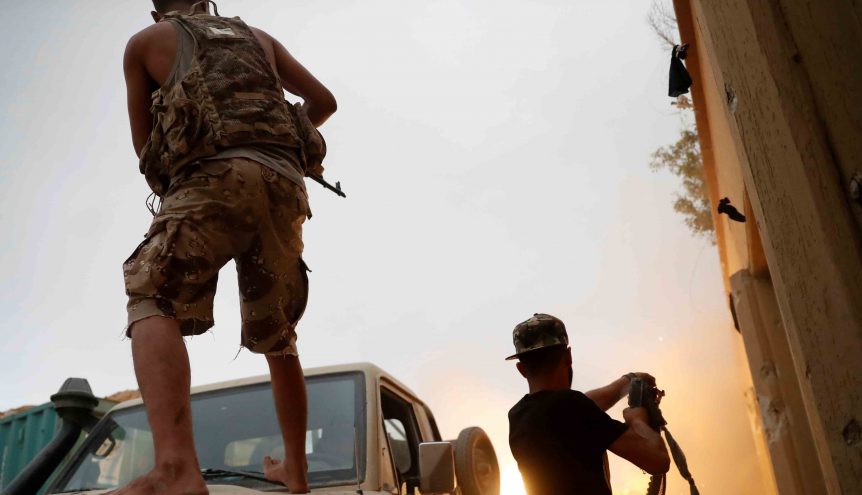Rights organizations in joint letter
Your excellency,
We are writing to express our grave concern about the extremely dire human rights situation in Libya, and to urge your delegation to support action to pursue scrutiny over the country’s human rights record at the ongoing 56th session of the UN Human Rights Council.
Over a year ago, in its final report to this Council, the Independent Fact-Finding Mission on Libya (FFM) concluded that, “there are grounds to believe a wide array of war crimes and crimes against humanity have been committed by State security forces and armed militia groups” and recommended that the HRC “establish an independent, international investigation mechanism.”
The serious violations of international human rights and humanitarian law, which continue to be committed by militias, armed groups and security forces across the country, and which may amount to crimes under international law, require urgent action on the Council’s part.
Documented violations include: enforced disappearances; extrajudicial executions and other unlawful killings; torture and other ill-treatment, including sexual and gender-based violence; and arbitrary arrest and detentions. Some of these acts amount to crimes under international law. The Tripoli-based Government of National Unity (GNU), the Libyan Arab Armed Forces (LAAF), who are de facto in control of most of eastern and southern Libya and allied to the “Libyan Government,” formerly the Government of National Stability (GNS), as well as affiliated militias and armed groups, have further relentlessly cracked down on civil society actors. They have done so through arbitrary arrests and detentions, enforced disappearances and abductions, social media surveillance, harassment, and other forms of intimidation, severely limiting their ability to document human rights abuses and raise awareness about the human rights situation in the country. Survivors of human rights violations in Libya have repeatedly raised concern about the inability and/or unwillingness of the domestic justice system to provide justice and redress. The situation has been undermined further by the fact that judges and prosecutors have also been targeted by militias and armed groups, with some among them subjected to enforced disappearance, threats and other forms of intimidation and harassment.
Despite these well-documented crimes, no commander or member of powerful militias or armed groups has been held to account for their involvement in crimes under international law. Instead, successive Libyan authorities have been integrating militias and armed groups with abusive human rights records into State institutions without any prior vetting, further entrenching impunity.
The HRC resolution on Libya adopted in 2023 following the FFM’s final report requested the Office of the High Commissioner for Human Rights (OHCHR) to provide technical assistance and capacity-building to Libya with a view to preventing further violations and abuses of human rights and ensuring accountability. One year on, the already grave human rights situation in the country has deteriorated even further, warranting, in turn, more than UN’s technical assistance – particularly given that the OHCHR’s ability to carry out even this limited capacity-building mandate was further undermined by obstructions faced by the Human Rights Section of the United Nations Support Mission in Libya (UNSMIL) (within which the OHCHR mission is embedded) in securing access to places of interest in many parts of the country and to key institutions.
The Office of the Prosecutor of the International Criminal Court (ICC) announced in November 2023 that it planned “to complete investigative activities in relation to the key lines of inquiry” in the Libya situation “by the end of 2025.” The ICC is currently the sole independent international body mandated to investigate serious international crimes, which continue unabated in Libya.
The three HRC-mandated independent inquiries for Libya – namely, the 2011- 2012 International Commission of Inquiry, the 2015-2016 OHCHR Investigation and the 2020-2023 FFM – have all found that a litany of serious crimes under international law had been committed in Libya. Nonetheless, to date, the information and evidentiary material gathered by these inquiries have yet to be followed up with any appropriate accountability measures against those allegedly responsible for these crimes.
We thus urge your delegation to support a resolution at the 56th session of the HRC that advances accountability for grave rights abuses in Libya, and that ensures ongoing scrutiny by the HRC of the rights situation in the country. It remains critical for the effective pursuit of accountability for such serious crimes that the HRC act upon the FFM’s final report recommendation by establishing an independent, international investigation mechanism that: (a) consolidates and builds upon the information collected by previous mechanisms, while investigating the most serious ongoing crimes and violations of international law, and (b) shares information with relevant national, regional and international courts with competent jurisdiction. At the very least, it is vital that the HRC maintains scrutiny over Libya’s dire human rights situation, or it will be perceived as acquiescing to ongoing violations and impunity.
We are available to discuss our recommendations with you at your earliest convenience.
Yours sincerely,
- Adala for All
- Amnesty International
- Cairo Institute for Human Rights Studies
- Defender Center for Human Rights
- Human Rights Watch
- Independent Organization for Human Rights
- International Commission of Jurists
- Lawyers for Justice in Libya
- Libya Crimes Watch
- Organisation Mondiale Contre la Torture
Share this Post

